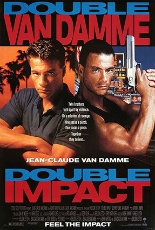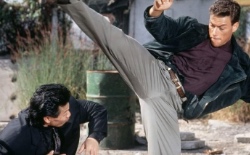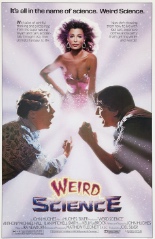
 Of all the movies from the 1980s loosely based on an Oingo Boingo tune, Weird Science still remains the breast — uh, I mean best – of the lot.
Of all the movies from the 1980s loosely based on an Oingo Boingo tune, Weird Science still remains the breast — uh, I mean best – of the lot.
Coming off his back-to-back directorial triumphs of Sixteen Candles and The Breakfast Club, even John Hughes was seemingly tired of all the laid-thick teen pathos; for his next film, he opted for a raunchy teen sex comedy where, instead of having what I feel would have been a full weekend of absolutely incredible lovemaking with Kelly LeBrock, the youngsters learn about themselves and each other. Good for them, I guess.
Gary and Wyatt (Anthony Michael Hall and Ilan Mitchell-Smith, respectively) are two teen-movie approved geeks repeatedly picked on by their horrible mulleted classmates. Instead of making a Terminator-like killing machine to wreak cold-blooded revenge on them, using their highly advanced (even for 1985) computer, they break into the Pentagon’s data files and invariably create The Woman in Red, seemingly just to stare at from afar.
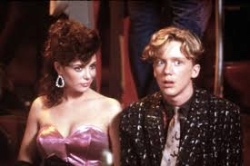 Lisa (LeBrock) is not only a gorgeous mature sexpot, but also has cyber-enhanced powers, warping time and space to fit whatever mood she’s in; great for us (but sadly for the impoverished children of the world), those powers mostly go into throwing the wildest party this side of the ’80s, complete with nuclear missiles, a piano getting sucked through the chimney and an appearance by The Road Warrior’s Vernon Wells as a post-apocalyptic biker.
Lisa (LeBrock) is not only a gorgeous mature sexpot, but also has cyber-enhanced powers, warping time and space to fit whatever mood she’s in; great for us (but sadly for the impoverished children of the world), those powers mostly go into throwing the wildest party this side of the ’80s, complete with nuclear missiles, a piano getting sucked through the chimney and an appearance by The Road Warrior’s Vernon Wells as a post-apocalyptic biker.
LeBrock was perfectly cast in an icon-making role, but that’s not to say Hall or Mitchell-Smith are by any means shabby in their archetypical nerd roles that defined a generation of dorks for HBO-obsessed youths; that being said, a special lifetime achievement award of some sort should have gone to Bill Paxton for the role of the meathead older bro Chet, mostly for introducing the phrase “You’re stewed, buttwad!” to the lexicon.
The gorgeous Arrow Video release of Weird Science not only delivers a 4K restoration, but both the theatrical and television versions of the flick are present, the latter of which is twice as funny for its barely legible curse-word redubs, which is especially great for the story where the girl of Gary’s dreams kicks him in the “guts” and calls him a “braggart” in front of everyone. —Louis Fowler


 They say one man’s trash is another man’s treasure. Make that other man a woman — specifically, Down Under filmmaker Sari Braithwaite — and the treasure is [Censored], a documentary constructed solely of film footage once banned by the Australian Censorship Board and now culled from the Australian National Archives. Over the course of 63 minutes, excitement over her find not only fades, but flips, as she narrates each step of a crisis of conscience.
They say one man’s trash is another man’s treasure. Make that other man a woman — specifically, Down Under filmmaker Sari Braithwaite — and the treasure is [Censored], a documentary constructed solely of film footage once banned by the Australian Censorship Board and now culled from the Australian National Archives. Over the course of 63 minutes, excitement over her find not only fades, but flips, as she narrates each step of a crisis of conscience.  She more than makes do. The displaced frames find a home as she initially sets out to examine and decry her homeland’s history of censorship, grouping the cuts thematically and presenting them with a modicum of context. We get a montage of screen kisses — chaste to erotic, consensual to forced, hetero- to homosexual — and think little of it. Young men then brandish knives, and their serrated machismo strikes the viewer of silly, if nothing else.
She more than makes do. The displaced frames find a home as she initially sets out to examine and decry her homeland’s history of censorship, grouping the cuts thematically and presenting them with a modicum of context. We get a montage of screen kisses — chaste to erotic, consensual to forced, hetero- to homosexual — and think little of it. Young men then brandish knives, and their serrated machismo strikes the viewer of silly, if nothing else.
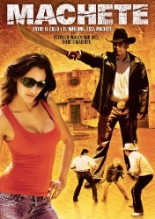


 A cabbie walks into a police station, and what happens next is not a joke. The tomboyish driver is Luz (featuring-debuting Luana Velis), and she has flung herself out of her car in the dead of night because she is being pursued by a demon. It happens.
A cabbie walks into a police station, and what happens next is not a joke. The tomboyish driver is Luz (featuring-debuting Luana Velis), and she has flung herself out of her car in the dead of night because she is being pursued by a demon. It happens. 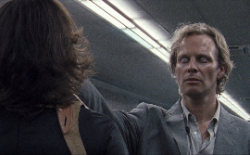 Luz is being sold as a horror movie in the mold of Dario Argento, Lucio Fulci and David Cronenberg. While their influence on Singer can be glimpsed, the pitch may be doing a disservice to the German film in setting audience expectations it cannot possibly meet. Those primed for a possession thriller filtered through those masters’ lenses will be ill-prepped for a near-somniferous pace that makes the slow-burn style of today’s reigning arthouse-horror hits (e.g.,
Luz is being sold as a horror movie in the mold of Dario Argento, Lucio Fulci and David Cronenberg. While their influence on Singer can be glimpsed, the pitch may be doing a disservice to the German film in setting audience expectations it cannot possibly meet. Those primed for a possession thriller filtered through those masters’ lenses will be ill-prepped for a near-somniferous pace that makes the slow-burn style of today’s reigning arthouse-horror hits (e.g., 